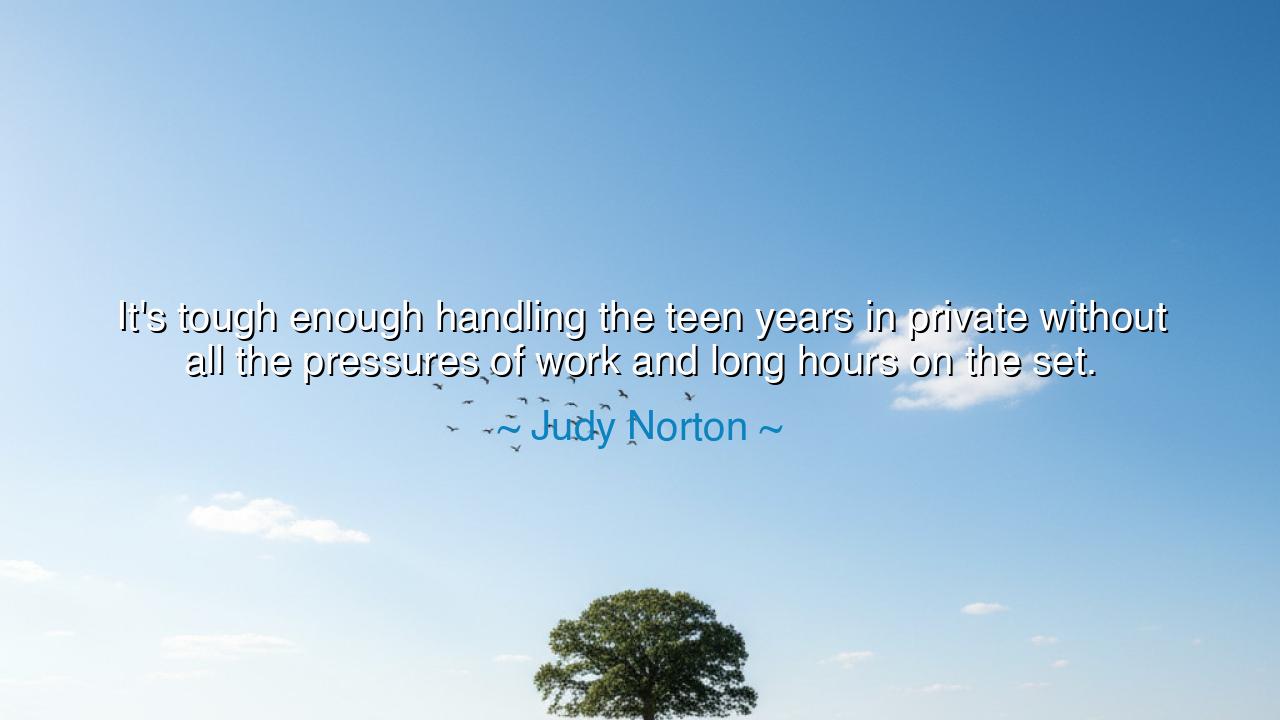
It's tough enough handling the teen years in private without all
It's tough enough handling the teen years in private without all the pressures of work and long hours on the set.






When Judy Norton, remembered for her role on The Waltons, declared, “It’s tough enough handling the teen years in private without all the pressures of work and long hours on the set,” she spoke not only of her own life, but of the burden carried by all young souls thrust too early into the gaze of the world. Her words are at once lament and wisdom: the teen years, already a crucible of change and turmoil, become far heavier when lived under the weight of labor and the unblinking eyes of the public. What is a struggle in private becomes an ordeal when exposed.
The meaning of her words rests in the recognition of adolescence as trial. To be a teenager is to pass through fire: the body reshapes itself, the mind wrestles with identity, the heart surges with both hope and despair. This passage is difficult enough within the quiet shelter of family and friends. But Norton reveals how much sharper it becomes when one must bear it while also meeting the demands of work—memorizing lines, standing beneath hot lights, living not only one’s own life but the scripted lives of characters. It is the doubling of burdens, and in that doubling, the risk of breaking.
History bears witness to this truth. Consider the story of child actors throughout the decades: Judy Garland, whose youth was consumed by the relentless schedules of Hollywood; Shirley Temple, who carried the smiles of millions while still a child herself; or more recently, stars who found fame in adolescence but struggled in adulthood with identity and stability. Each reveals the truth of Norton’s words: that when youth is given no space for privacy, the soul bears scars invisible to the eye.
But her words also carry a tenderness toward all who are young, famous or not. For though most do not endure the glare of the stage or screen, every youth endures the feeling of being watched, judged, and misunderstood. School hallways, playgrounds, and early workplaces become stages of their own, where the pressures of work, study, and expectation weigh heavily. Norton’s insight is thus universal: to be young is to walk between discovery and demand, longing for freedom but pressed by duty.
And yet, there is a lesson in her endurance. Norton did not speak these words in despair, but as one who survived and reflected. Her acknowledgment of the hardship is itself a gift, for it tells the young and those who guide them: be gentle, for these years are sacred and fragile. Let privacy be honored where it can be, and let work be balanced with care. For even in hardship, growth is possible—but growth should never come at the cost of crushing the spirit.
O seekers of wisdom, take this teaching: when you see the young, whether they are on stage or in the quiet shadows of life, remember that they bear battles unseen. Do not add to their burden with harshness or impossible demands. Give them space to stumble, to grow, to discover themselves without the relentless weight of perfection. For the youth who is nurtured with patience will blossom into strength; the youth who is pressed too hard may wither before their time.
Therefore, let Norton’s words echo in your heart: “It’s tough enough handling the teen years in private without all the pressures of work.” Let them be a reminder to balance ambition with compassion, expectation with grace. And for those now walking through their own storm of adolescence, remember—you are not weak for struggling. You are simply human, passing through the fire that shapes the soul. Hold fast, endure, and seek rest where you can, for beyond these years lies the strength forged only by having walked through them.






AAdministratorAdministrator
Welcome, honored guests. Please leave a comment, we will respond soon